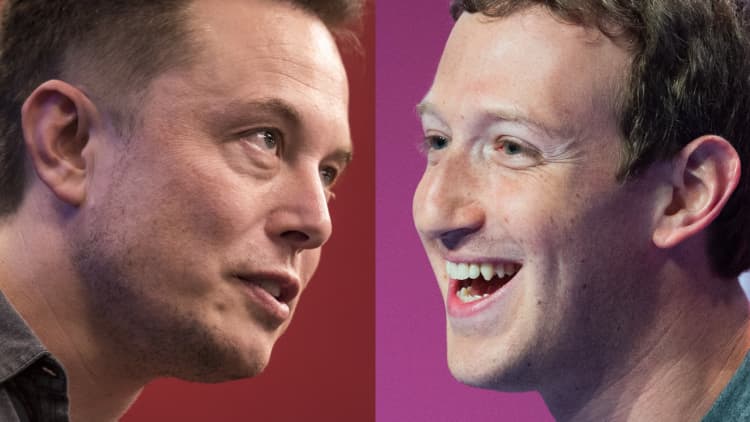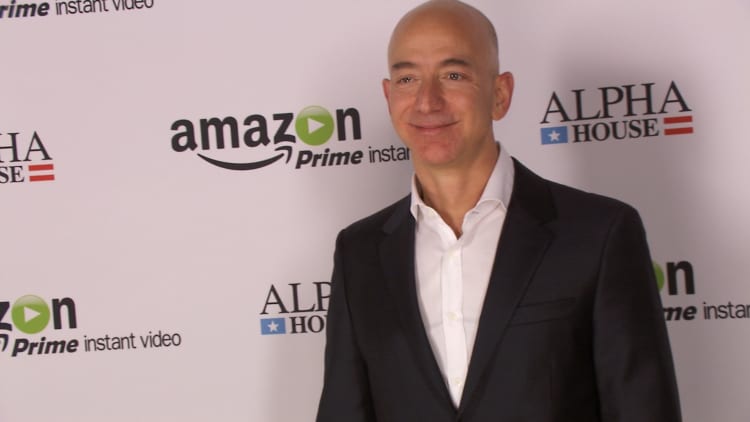Before there was Bill Gates and Jeff Bezos, there was P.T. Barnum, an entrepreneur who was known as one of the richest men in America.
Hugh Jackman's new movie, "The Greatest Showman," brings to the big screen the spectacle of a story that was Barnum's life. The famous 19th-century entrepreneur dabbled in everything from publishing a newspaper to running a museum.
But Barnum's true claim to fame was helping make the circus an explosively popular form of entertainment with his iconic Ringling Bros. Barnum & Bailey Circus, which closed after nearly 100 years in May.
Some of Barnum's entertainment tactics were and are not to be emulated — he used people with disabilities as "human curiosities," he purchased a black woman and supported blackface and, in modern times, his namesake circus was accused of the poor treatment of animals.
He's a controversial figure, no doubt. However Barnum is also remembered for his entrepreneurial spirit and business acumen, and his professional advice is often reprinted in books aimed at self-starters.
In his own 1880 book, "The Art of Money-Getting or Golden Rules for Making Money," Barnum preaches 20 rules that are still applicable today, like preserving and practicing determination. In addition to outlining attributes and traits of success, Barnum also hashes out concrete business tactics and strategies.
Here are a few of Barnum's rules for success that are still relevant.
"Whatever you do, do it with all your might"
In Barnum's book, he preaches about hard work, writing, "Work at it, if necessary, early and late, in season and out of season, not leaving a stone unturned, and never deferring for a single hour that which can be done just as well now."
While that language may be a bit outdated, the idea is not. Tech billionaire and Tesla CEO Elon Musk has also touted the importance of doing whatever it takes to succeed.
"You've got to do all sorts of jobs and tasks that you might not wish to do, that are not intrinsically interesting to you," Musk said during an August 2013 Google Hangout hosted by Google for Entrepreneurs. "You've got to be prepared to do whatever it takes, work whatever hours. No task is too menial."
More recently, he spoke of his willingness to get on the front lines with his employees to get the job done.
"I always move my desk to wherever — well, I don't really have a desk, actually. I move myself to wherever the biggest problem is in Tesla," Musk recently said during a Tesla earnings call. He said he had been working in the Gigafactory until the wee hours of the morning, helping diagnose calibration issues. "I really believe that one should lead from the front lines, and that's why I'm here."
"Read the newspapers"
"He who is without a newspaper is cut off from his species," Barnum writes.
A century ago, Barnum noted the importance of staying informed on the latest inventions and improvements. Today, many of the most successful people in the world also say reading is crucial.
Berkshire Hathaway billionaire Warren Buffett spends five or six hours a day reading, according to the HBO documentary, "Becoming Warren Buffett." That includes the six newspapers he devours on a daily basis: The Wall Street Journal, The Financial Times, The New York Times, USA Today, The Omaha World-Herald and American Banker.
Microsoft co-founder and billionaire Bill Gates goes through 50 books a year, mostly nonfiction.
And billionaire tech founder Mark Cuban says he reads three hours every day. "Most people won't put in the time to get a knowledge advantage," he writes in a 2011 blog post. "To this day, I feel like if I put in enough time consuming all the information available, particularly with the net making it so readily available, I can get an advantage in any technology business."

"Be systematic"
Barnum was a believer in time management.
"Men should be systematic in their business," Barnum writes. "A person who does business by rule, having a time and place for everything, doing his work promptly, will accomplish twice as much and with half the trouble of him who does it carelessly and slipshod."
Multimillionaire real estate tycoon Barbara Corcoran also says that planning ahead is a key to success.
"Too much on your plate gets in the way of building the business you dreamed of having when you first started out," says Corcoran, an investor on ABC's "Shark Tank." "Lucky for all of us, time is reliably fair and doles out 24 hours a day to everyone, but it's how you make the most of it that really counts."
"Do not scatter your powers"
Focus, Barnum says, is essential to success.
"Many a fortune has slipped through a man's fingers because he was engaged in too many occupations at a time," Barnum writes. "There is good sense in the old caution against having too many irons in the fire at once."
A century later, having focus is still something to strive for. Tim Cook, CEO of Apple, says what he admired most about Apple founder Steve Jobs was that very same attribute.
"He had a focus that was unlike any other," Cook said, explaining why Jobs was the person who influenced him most.
"Be polite and kind to your customers"
"Politeness and civility are the best capital ever invested in business," Barnum writes. "Large stores, gilt signs, flaming advertisements, will all prove unavailing if you or your employees treat your patrons abruptly. The truth is, the more kind and liberal a man is, the more generous will be the patronage bestowed upon him."
Barnum should have extended his philosophy to those he employed, be they humans or animals. But the sentiment is one that many modern-day entrepreneurs say they rely on.
Elon Musk regularly addresses Tesla customers' issues over Twitter, thanks them and asks for their input. The tech CEO has even tweeted at a single, frustrated customer on a Friday night, showing his commitment to customer service.
Robert Wang, inventor of the current kitchen craze Instant Pot, recently revealed how he shows his gratitude toward customers. In all official branding photos for the product, the timer reads 5:20, which when spoken out loud, sounds like "I love you" in Mandarin, his native language, according to the New York Times.
"Customers are most important for us. As inventors, we feel good if our invention has created value for people. So we put 5:20 on each cooker," Wang told CNBC Make It.
Don't miss: 11 books that will teach you to get rich, summed up in a sentence

Like this story? Like CNBC Make It on Facebook!


